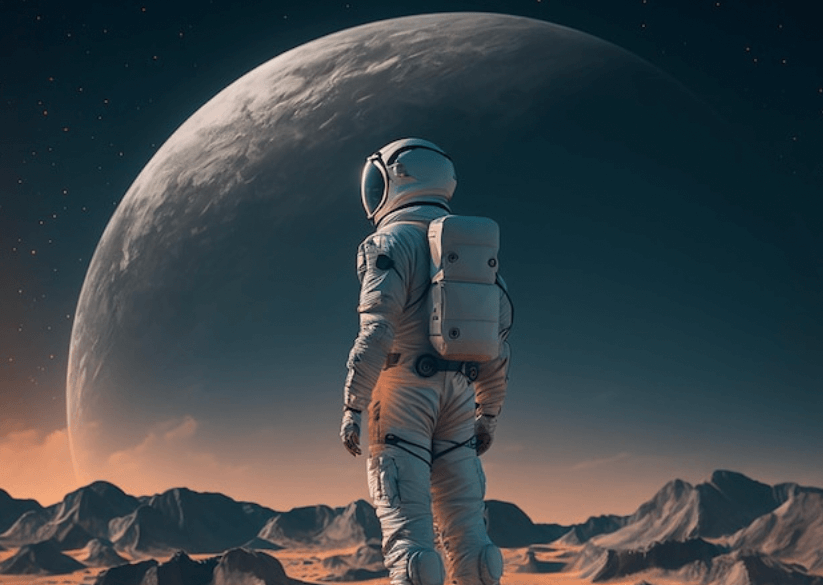Writers who are blessed with truly creative minds often contemplate other-worldly scenarios where their characters exist far beyond our physical planet. Their rich imaginations are busy weaving extraordinary complex tales that surpass time and space, creating alternate worlds with roots in technology, science, and even mythology. Of course, these writers naturally gravitate toward the science fiction genre.
Writers that fit this mold are provided with a wide array of science fiction subgenres to lean into. Allow this guide to help explain the science fiction genre, to define the various subgenres of science fiction, to share some of the top science fiction authors, and to provide some handy tips for writing science fiction.
What is Science Fiction?
Let’s start with the basics: What is science fiction? While you may assume science fiction would be easy to define, authors have struggled for decades to do so. It is a difficult genre to pin down to a specific definition.
Some of the terms used to describe science fiction include:
- The literature of ideas
- The reaction of humans to changes occurring in science and technology
- Speculative fiction about future events based on past and present realities
- Adventurous stories that unfold in epic and complex worlds
Themes in science fiction may include extraterrestrial life, time travel, space travel, science and technology, and superheroes. The stories may be inspired by the sciences, like astronomy, physics, and chemistry, or by the social sciences, like anthropology, sociology, and psychology. As you can see, when pondering, “What is science fiction?” it is clear that there are diverse ways to define the genre.
Popular Types of Science Fiction
Because the science fiction genre is so diverse, writers benefit from having a basic understanding of the most popular subgenres within the genre. These subgenres include:
Space Opera
This subgenre features adventures that play out in outer space and often involve extraterrestrial beings. Just like a soap opera, space operas involve an ongoing story arc, with recurring characters. Themes may include intergalactic battles, space travel and exploration, and politics. A good example of a space opera is the best-selling novel Dune by Frank Herbert.
Cyberpunk
Cyberpunk features stories that unfold within a dystopian, futuristic setting. Cyberpunk story arcs routinely explore the juxtaposition of high tech with societal decay. The book Snow Crash by Neal Stephenson and the film Blade Runner are good examples of cyberpunk. Themes may address the impact of computer technology on humanity, virtual reality, cyborgs, and cyber-warfare. This genre avoids utopian themes and features the darker dystopian themes instead.
Steampunk
This subgenre is based on a synthesis of the nineteenth-century steam-powered era and modern technology. It weaves stories set in the Victorian period that imagine fictional, futuristic machines and technology driving the culture at that time. Authors within the steampunk genre include The Invisible Man by H.G. Wells and Twenty Thousand Leagues Under the Sea by Jules Verne.
Post-Apocalyptic
The apocalyptic/post-apocalyptic subgenre features speculative doomsday scenarios. Stories explore themes focused on the world as it is falling apart, or the plot may unfold in the aftermath of a collapsed society. Post-apocalyptic story arcs highlight the human struggle for survival amid the destruction of society. Examples within this genre include The Road by Cormac McCarthy and Edge of Collapse by Kyla Stone.
Parallel Worlds
The concept that propels the parallel worlds subgenre is the existence of an infinite number of alternative worlds or universes that exist in other dimensions, right alongside our own. This subgenre features stories about individuals who travel to these parallel worlds and explore their very different lives there. An example of the parallel worlds subgenre is How You Lose the Time War by Max Gladstone.
Top Science Fiction Authors
Planning to write a sci-fi novel? If so, it’s a good idea to begin your book project by immersing yourself in as many books by best-selling science fiction authors as possible:
- Frank Herbert, author of Dune
- Margaret Atwood, author of The Handmaid’s Tale
- Aldous Huxley, author of Brave New World
- Andy Weir, author of The Martian
- Mary Shelley, author of Frankenstein
- Ray Bradbury, author of Fahrenheit 451
- Ursula Le Guin, author of The Left Hand of Darkness and A Wizard of Earthsea
- John Scalzi, author of Redshirts
- H.G. Wells, author of The Time Machine
- George Orwell, author of Nineteen Eighty-Four
- Alistair Reynolds, author of Revelation Space
8 Tips for Writing Science Fiction
Are you ready to embark on your own imaginative science fiction book project? Here are some important tips for writing a high-quality science fiction novel:
- Choose a subgenre first.
- Come up with a concept by deciding what question your story is asking.
- Define the central conflict.
- Create a complex world with believable structures.
- Determine who are the power holders in the story.
- Sketch out and develop rich characters.
- Limit exposition.
- Be sure the rules of your world are logical and consistent.
Publish a Science Fiction Novel with Gatekeeper Press
Science fiction is one of the more difficult genres to master. If you love science fiction and are embracing this challenge, why not get a little guidance along the way? The publishing experts at Gatekeeper Press are here to provide you with all levels of editing, book cover design, and the distribution and marketing of your book. Reach out to us online today!
Tweet: Wondering “What is science fiction?” Learn about this complex genre and the different subgenres writers can choose to pursue in this guide. #SciFiwriter #GatekeeperPress #GKP

